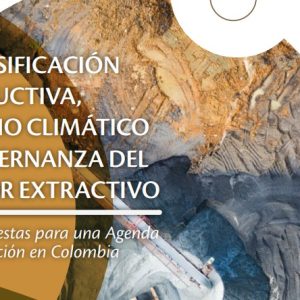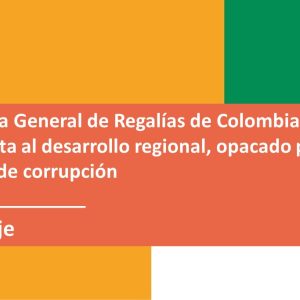This Agenda is the result of the reflection that the National Forum for Colombia and the Central Region Forum – members of the Civil Society Table for Transparency in the Extractive Industries – have been carrying out in the last ten years on the role of extractive activity in the country, through studies carried out by the Extractive Industries Observatory, and contact with local communities and a wide range of social organizations with which they work in their regions of influence.
Productive diversification, climate change and governance of the extractive sector: 75 proposals for a transition agenda in Colombia is the title of the publication of Foro Región Central and Foro Nacional por Colombia, which had the support of Brot für die Welt and Ford Foundation, which presents the result of more than ten years of systematic analysis on the behavior of mining and hydrocarbons in the country. The Agenda raises several important issues for the current debate on the construction of a fairer, more sustainable and equitable development model in Colombia, with the participation of the communities in the decisions that are made regarding the territory, the economy and the protection of the environment. .
The Agenda presents a diagnosis of the results of public policies promoted by recent governments that have favored the exploitation and export of minerals and hydrocarbons. In addition, it shows the inconvenience of the extractivist emphasis of our development model, since it has generated a reprimarization of the economy – that is, the economy has been based on activities of the primary or extractive sector – without generating the positive impact on formal employment that It is expected and has put the country in a very vulnerable situation in the face of fluctuations in the international prices of raw materials.
Likewise, it draws attention to the sector, since despite the impacts generated by large farms in the territories and their population – as well as in the ecosystems and the sustainability of fauna and flora, rivers and sources of water – A large part of the communities and local authorities are excluded from decisions about mining and hydrocarbons. This fact has become one of the main sources of social conflicts in Colombia and is related to the threats and deaths of social leaders who seek to defend their territory from extractive projects.
The Agenda points out a route to advance in the discussion of a development model less dependent on minerals and hydrocarbons. There are 75 proposals in terms of productive diversification, energy transition and governance. Each of them identifies the measures that the government can adopt, the institutional changes that are required, the fiscal resources that must be available, and the role of public, private, and social actors in this process.
In terms of productive diversification, the country must considerably reduce its high dependence on the income generated by the export of minerals and hydrocarbons, because most of the economic blocks have proposed measures to reduce the use of these fuels and if the country does not align to these measures and does not encourage the growth of other productive sectors, could experience a deep economic crisis in the medium term.
An issue of great relevance is the energy transition, on which Colombia must give a serious discussion to change its consumption matrix, including renewable energy sources and, in addition, with the duty to reduce its contribution to the international inventory of polluting emissions due to its export of oil and coal. This is in harmony with the climate change agenda that requires urgent measures from all states to stop an environmental catastrophe in the coming decades, the need to protect water sources and nature, and the importance of conserving the livelihoods of communities. .
Also, the Governance Agenda outlines measures to promote dialogue between the nation and the territories, to reach agreements on a fairer development model, and proposes strategies to include citizen participation in public policy decisions, with actions to guarantee transparent rules of the game for all stakeholders interested in contributing to the development of the country.
Finally, this Agenda proposes a transition approach with a time horizon of ten to fifteen years, understanding that it is not possible to change the extractivist economic approach overnight. Therefore, progressive measures must be included so that a negative impact is not generated on the income of the State and on the territories that depend on mining and hydrocarbons. Likewise, it makes a call to implement institutional, regulatory and policy changes that must be specified, carried out and guarantee their continuity.
_____________________________________________________________________________
This document will be presented at an event called Just and Sustainable Post-Extractivist Transition in Colombia: Challenges and Proposals, which is organized by Foro Región Central, Foro Nacional por Colombia and the Faculty of Finance, Government and International Relations of the Externado de Colombia University.
The event will take place next Thursday, September 29 at the Externado de Colombia University: calle 12 # 1 – 17 Este from 9:00 a.m. to 5:00 p.m. to 12:00 p.m. Registration is enabled at the following link: https://bit.ly/3U8LBlu (limited capacity).


